How do you open up a dialogue with someone whose world views are the opposite of yours? How does an artist and feminist gets an “icon” of the manosphere to talk to her about role models, haircuts, “natural” sex roles, echo chambers and “degenerate lifestyles” being forced “upon us normal people”? Reading the 4 lines I’ve just written makes me realise that I wouldn’t be able to engage in such a conversation. Angela Washko, however, did succeed in persuading Roosh V to discuss with her for 2 hours straight. It was no mean feat.
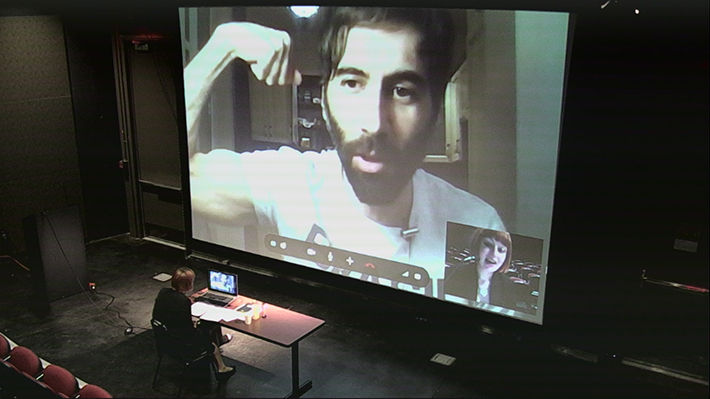
Angela Washko, still from BANGED: An Interview with Roosh V, 2014
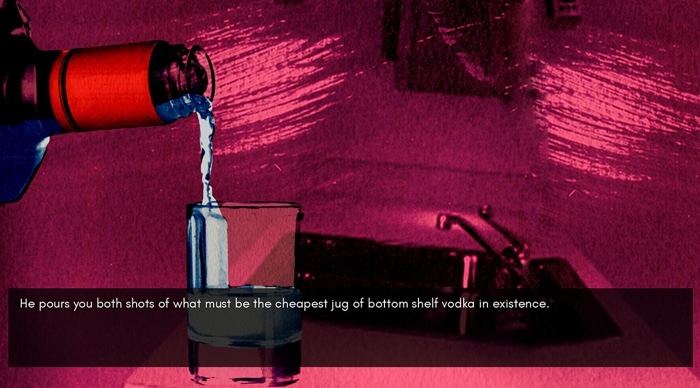
Angela Washko, The Game: The Game, 2017
Washko is a feminist artist, curator and gamer who uses performances, games and other interventions to create new forums where those who are hostile toward women end up discussing with her about feminism. Roosh V used to be a pickup artist, one of those self-proclaimed “alpha males” whose hobby consists in attempting to bed women through a string of manoeuvres called “the game.” He has since reinvented himself as a committed Christian, slightly reframing his misogyny and beliefs in the so-called traditional heterosexual lifestyle in the process.
To prepare this interview with the Web’s Most Infamous Misogynist, Washko built on her experience with The Council on Gender Sensitivity and Behavioral Awareness in World of Warcraft, a series of performances within World of Warcraft during which she drew players into discussions about the ways in which the communities therein address women and respond to the term “FEMINISM”. The WoW experiments might not have resulted in a massive drop of online male chauvinism but they showed an ability to listen and look beyond polarised opinions.
Angela Washko, BANGED: A Feminist Artist Interviews the Web’s Most Infamous Misogynist, 2014
When I contacted Angela Washko and asked her if she had time for an interview, there was still a slight chance that her solo show would open this Spring at STUK, House for Dance, Image and Sound in Leuven (BE.) Unfortunately, given the spread of the corona virus, the cultural centre is closed until the end of May. As for the opening of the exhibition Angela Washko: POINT OF VIEW, it has been postponed until 2021.
Angela selected one video work from each of the four bodies of artworks that would have been on show in Leuven and STUK is now showing them as a kind of digital preview. The exhibition will be richer and more engaging than this preview of course but until the artist and her works can actually go back to Leuven, these videos are a great introduction into her world and practice. I’m looking forward to visiting the show next year. In the meantime, here is a transcript of the Skype conversation I had with the artist:
Hi Angela! How do you stay so cool and focused when confronted with boorish clichés about women and the LGBT community? Watching Roosh V talk to you in BANGED made me want to eat my own hair. Yet, you remain perfectly collected and attempt to better understand what motivates people like him. You show similar tolerance in the WoW performances. Did you have to prepare yourself before embarking on the Roosh interview?
Before that specific interview, I had some relevant experience working inside of World of Warcraft through a project I called The Council on Gender Sensitivity and Behavioral Awareness in World of Warcraft”. I assumed that some of that experience talking to players about why the social culture in WoW had become so homophobic, racist and misogynistic might be useful in trying to facilitate conversation with people who have radically different points of view in the online manosphere space that Roosh participates in.
I did a lot of homework in order to prepare to have this conversation with Roosh V whom I would say is pretty much ideologically the exact opposite of me. I don’t think I could come up with another person I could disagree with more strongly. I had read some of his books already. Bang, Day Bang, Don’t Bang Denmark, Bang Iceland… All these “get laid quick” pickup artists guides. Having read all those, I already knew that he prefers women who are immediately submissive and who maintain submissiveness throughout exchanges with him. That’s not really who I am so I had to prepare for this performance of submissiveness. It was very painful and difficult. If you watch the whole interview, you can see me laugh, get very red or I’m kicking my leg a lot because I’m so uncomfortable. But because my background is in performance, I was treating it like a rule-based performance and the main rule was “If you stop being submissive, the conversation will end” so there was a strategic employment of submissiveness.
Besides, he had written this blog post on his website called How to do interviews with the mainstream media which was my primer into what not to do if you don’t want Roosh to stop talking to you. It included a lot of things he is very sensitive to. He is convinced that he is constantly being misrepresented by the media so he won’t do interviews unless you agree to post them in their entirety. That’s another thing that had to be part of the “contract” for participation.
I think I was mindful of what he is not comfortable with but I had to train myself to perform what he is comfortable with.
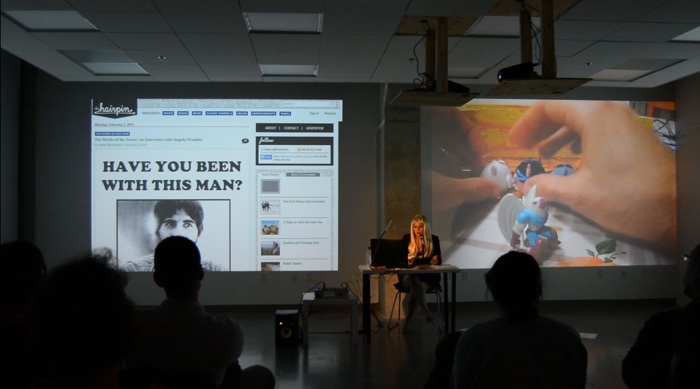
Angela Washko, Tightrope Routines, Performance w/ Multi-Channel Media Installation at UC San Diego, 2015
But how did you get him to talk to you? Wasn’t he a bit suspicious about who you were and what your motivations might be?
He was indeed very suspicious. I actually wrote an essay called Tightrope Routines for Field Journal, a publication for socially-engaged art criticism.
I was already working on a campaign to find women who had been targeted by him, who had experienced his pick-up art practices because I wanted to write a companion book slash web project called BANGED. He already knew about my campaign because I was using tactical media/culture jamming style distribution of information online to get people to respond to my call.
When it became obvious to me that he knew about it, I thought that it might be an opportunity to engage with him and try and understand his practice and his strategies more deeply. I wanted to know if it was just an elaborate mythology.
I reached out to him over email and I was very clear about my hope to have a conversation across these very polarising points of view. Online feminism vs online manosphere. I argued that this kind of exchange would be interesting to mainstream media. I figured it might be a pro for him. He likes attention.
I told him that there was already an agreement that it would be shown in museums and galleries, that maybe it would get some cultural capital bangs and I also offered him the grant money that I had received for winning an internet art microgrant from Rhizome. He was super insulted by the offer of money. I should have realised that, according to his ideologies, it was very emasculating to be offered funds from a woman.
He was nevertheless very interested in being included in art and cultural spaces. He ultimately agreed to an email interview but he set the terms: I could send him one question per day and he would give me a response. If he liked the question, I’d be allowed to ask another one….
Oh! Come on! Really?
I did that for a month. Very earnestly. Eventually he wrote back that he didn’t think that my questions were designed to exploit him and that he would be comfortable with the video interview. It took a month of sending one carefully worded question per day. There was quite a process behind the scenes.
I included my emails to him in that Field Journal essay.
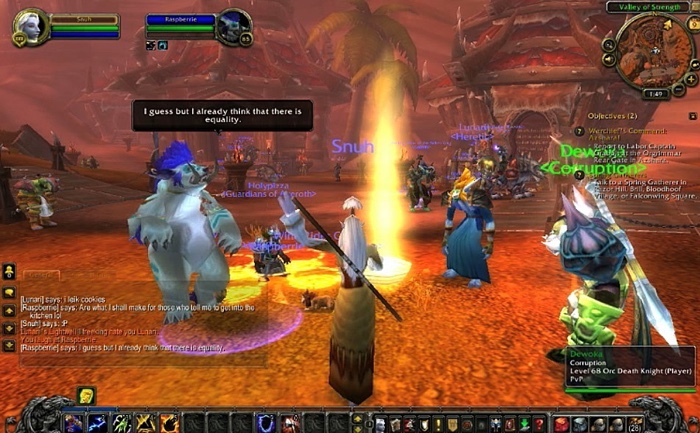
Angela Washko, Asking the World of Warcraft community (or one of them) to provide me with their definitions of feminism and feminists, from The Council on Gender Sensitivity and Behavioral Awareness in World of Warcraft, 2013
Angela Washko, Nature from the series The Council on Gender Sensitivity and Behavioral Awareness in World of Warcraft
I’m also curious about the language and approach you adopt. Did you address a player on WoW differently than you would address a pick-up artist over a Skype conversation where you can see each other’s face and watch each other’s eyes? Is the conversation less difficult or more sincere over Skype than on WoW for example?
A lot of people asked me about that when I was working on the WoW project. They were concerned that people would troll me, lie, make stuff up, etc. In a fantasy environment where there are orcs and trolls, where players are flying on dragons and rockets, everybody is masked behind an avatar. However, the commitment that I had to the space, the amount of time I had spent in these performances made it possible to wear down anybody who was really intent on trolling and I just invested in people who were interested in participating in it. It was obvious by the type of equipment I was wearing and by my knowledge of the space that I had invested a lot of time in it. Sometimes people would come in and try to disrupt it at first and then they’d sit there for an hour, watching how things would go and they’d start to participate more sincerely even if they disagreed with somebody sharing their story about harassment in the space. I think I developed strategies to even include the people who wanted to disrupt. I would just say “that’s fine, you are a part of this and if you want to throw fireballs at us while we’re talking, that makes the conversation look even more interesting. Thank you so much!” It made it hard for them to feel like their trolling was effective. If they were jumping on my face. I would just react with an “OK. Thanks for that!” That approach neutralised any trolling.
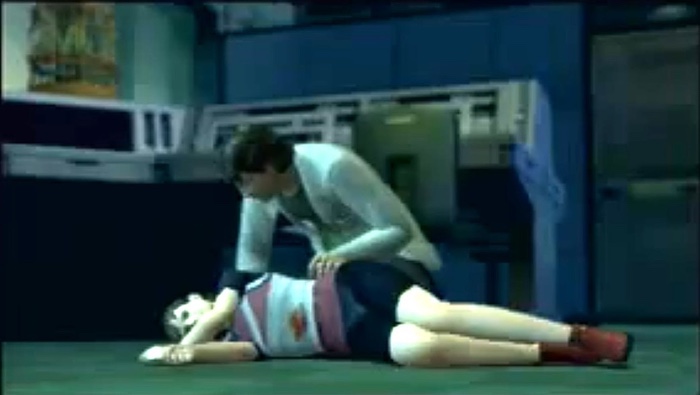
Angela Washko, Heroines with Baggage, 2013
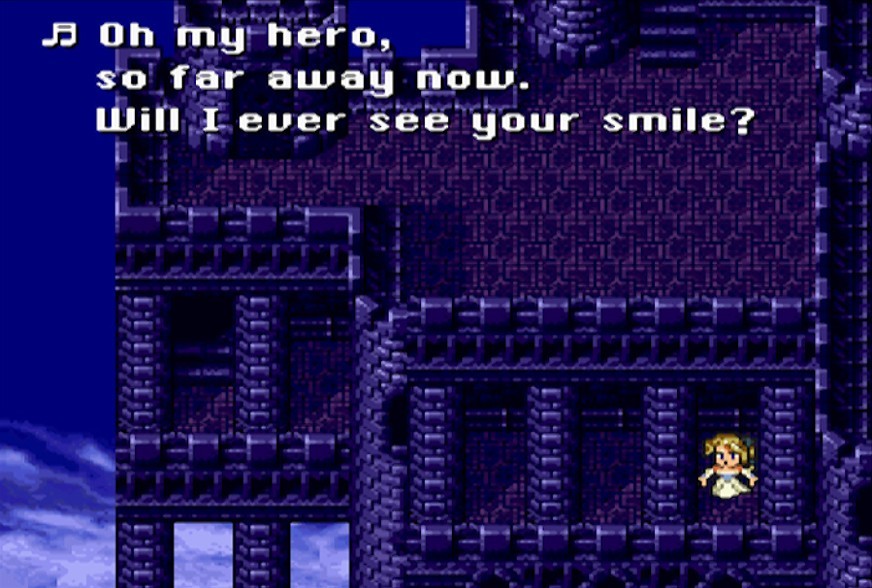
Angela Washko, Heroines with Baggage, 2013
This might sound like a naive question but i would have expected the WoW community to be a bit more respectful towards women. Mostly because many men get to adopt the avatar of female characters, most of which are pretty kick-ass. This clearly contrasts with the kind of female characters you document in Heroines with Baggage. Why am I so wrong to assume that powerful female characters adopted by men don’t necessarily translate into men who respect women?
I can’t speak about European servers. I only spent time on European servers when I was teaching in Germany but most of my experience is on US servers.
The phenomenon of men playing women was pretty unique to WoW when it started so I interviewed a lot of players about why they play women and nobody said it was to experience what it was like to wander through WoW as a woman. Most people said that they liked to play women avatars because they could project their fantasy onto their avatar and because in WoW, unlike in many first person games, you are actually positioned behind your character. Which makes this projecting, this fantasy of control over the characters possible. Others told me they were afraid to play male avatars because it would make them seem gay. Other men just felt the pressure to play female characters either because the design was more interesting or it was just what was normal in the space.
With that said, when I would explore a dungeon with a bunch of other people I didn’t know and all the avatars would be women but only one of us was actually a woman, they would wait for a signifier. I think I jumped up and down too many times, used too many smiley faces and all of a sudden I would go from talking strategy and killing enemies to having each person in the raid sending me private messages “I’ll pay you to go on Skype with me” and harassing me in other ways. Once somebody knows or assumes that you are a woman you might get messaged and asked for sexual favours in exchange for in-game gold.
Do you feel that what happens in WoW is symptomatic to what is happening in society at large or is it just a specific microcosmos that doesn’t represent the whole society?
Most of my projects were done during the Obama Presidency in the US. At the time, conservative people felt that we were in an age of political correctness, that nobody could say edgy things anymore, etc. Because of the moderation of racism, homophobia and misogyny in other places, I felt that WoW had become this relatively unmoderated place where people could express what they considered to be simply politically incorrect views (but that other people might call racism, homophobia and misogyny.) I felt that they were reclaiming that space to express what they felt were “suppressed” views. It might be different now. The media landscape has changed so much that I feel that a lot of these spaces are becoming more and more fluid and similar. Although I would say that there are MMORPGs like Final Fantasy XIV that have very generous, warm and inviting communities. I was in a queer-inclusive community called Rainbow Brigade. Nothing like that would have existed during the time that I did the WoW project.
I think that there are other games that are more interested in having community guidelines that keep people from feeling oppressed or exploited and that implement stricter punishment on those who go against them. I think this creates a different type of inclusive space.
Angela Washko, The Game: The Game [Trailer]
I’m curious about the people you portray in The Game: The Game. Did they in any way react to your pick-up artist dating simulator? On the other hand, were you not afraid that the game would become a kind of user’s manual to becoming a successful pick-up artist?
These are all big questions! All the material in The Game: The Game is taken from actual coaching material from these real life male seduction coaches whose real names and likenesses appear in my game.
I assumed that Roosh at the very least would become familiar with the game. I think it’s been discussed in the Roosh V community forum but I tend not to go to that space because it is a really horrible space for women. There was a whole thread about me for a while and it was so vile.
I realized I had gotten the attention of some of the pick-up artists in my game, after I published a piece for The Nation and did a bunch of data visualisation pieces as well as a new interactive text work which tied The Game: The Game to the actual source material that I had used.I didn’t want to shovel all of the original research materials into the game itself but I wanted to create a kind of companion reader to that game. A couple of weeks after that piece was published, both The Nation and myself received cease and desist letters from the lawyers representing Real Social Dynamics, a dating coaching company that has recently re-framed itself as a lifestyle coaching company. Two seduction coaches in my game work for Real Social Dynamics – Julian Blanc and Owen Cook. They were named in the cease and desist letter as the individuals damaged by my game. Some people told me to frame the letter, and I recently have!
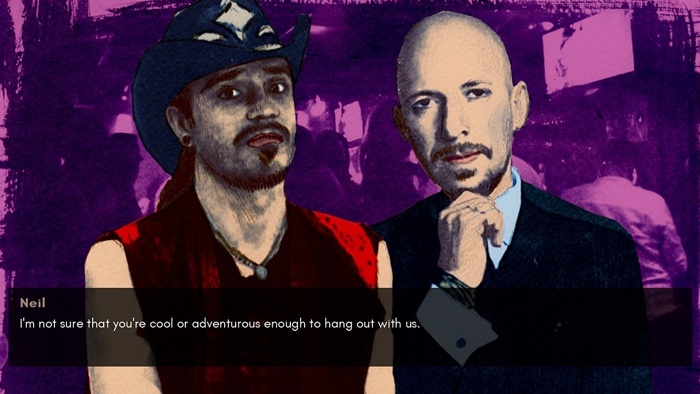
Angela Washko, The Game: The Game, 2017
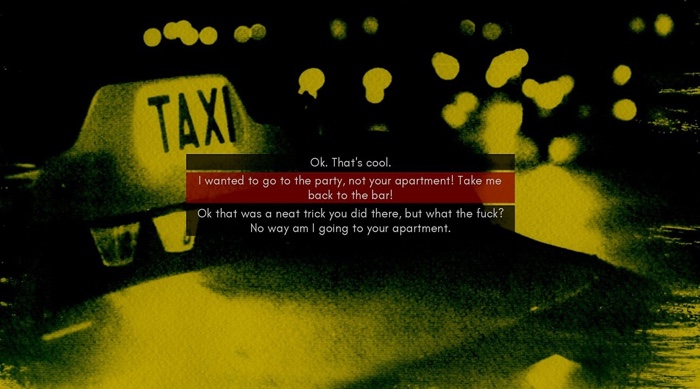
Angela Washko, The Game: The Game, 2017
Weren’t you expecting that? Some artists see it as part of their practice to launch a provocative project and then hope they will get this kind of cease and desist letter which then forms part of the final artwork.
A reason why I didn’t anonymise the pick-up artists in my game or change their names was because I felt that it was really important to use their own materials and hold them accountable for all of the manipulative seduction coaching products that they monetarily benefited from. They’ve sold their products to hundreds of thousands of men who are practicing these oftentimes very aggressive techniques in public. I thought it was important to hold them accountable by making it clear that these are real people, these are the real strategies that they are suggesting.
When I get to give talks about the work, I also show some of the original video coaching materials that were used to make The Game: The Game. I knew that doing that comes with risks. With Real Social Dynamics taking down all of their pick-up material from their online stores and rebranding themselves as this other type of company, I knew that somebody was not going to be happy that the game was going to potentially preserve some of the practices that they are now trying to quietly erase. You can’t even get Roosh’s Bang books from his online store anymore. He is trying to reframe himself as some christian evangelist person. They are all trying to figure out how to pivot.
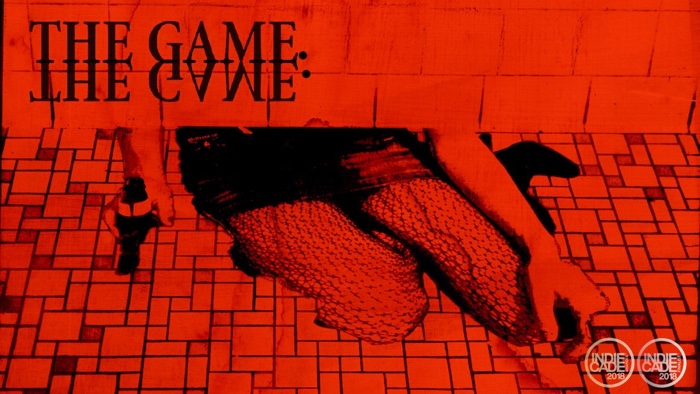
Angela Washko, The Game: The Game, 2018
How did it end? How did you respond? Did you have to remove any of the content?
I can only say what I am allowed to say at this point. I reached out to the Electronic Frontier Foundation. For years, I worked for Igor Vamos of The Yes Men so I called Igor saying “You guys get sued all the time. Who helps you? How do you deal with it?” He told me that the Electronic Frontier Foundation might be interested in my case. Igor connected us, I told them my story and they said they would be happy to represent me.
What are you working on at the moment?
In 2018, I had started thinking about doing a documentary film about this house where a bunch of pick-up artists had lived together in Los Angeles. They called it Project Hollywood. They used it to host pick-up artists coaching sessions charging participants something like 3000 dollars a head to stay in this Hollywood mansion and go to bars to try and pick up women. I definitely think the film should exist, but I was so exhausted working with that disturbing material for so long. I tried to remain upbeat and I think I have developed a certain amount of defense to it, but it is really hard to immerse yourself in this type of material which often treads into the territory of sexual assault. Especially when you see in the conference footage how many men are in the audience. It’s one thing to watch a video made by a pick-up artist sharing all of his fucked up techniques. It’s another thing to see it being enacted by a large public.
I got grants to do this film but I couldn’t do it then. Trump had been elected and I needed to go in a totally different direction and work on something that celebrated a community I really cared about.
I returned to my performance roots and decided to make a film about RuPaul’s Drag Race and its impact on the drag community and in the queer performance community. For the last 2 years, I’ve been working on a project about Mrs. Kasha Davis who was on Season 7 of RuPaul’s Drag Race and left her regular job as a telemarketing manager to pursue being a full time professional entertainer. She is based in Rochester. I followed her on tour all over the world. Mrs. Kasha Davis didn’t finish first on the show, and she has faced a lot of challenges on her journey to find stardom as a drag queen. She is older than most people who’ve competed on the show, she’s not based in a major city, she doesn’t have the same artistic background, and she has a very specific character – a 1960s era housewife…so she doesn’t really fit into the mold of the type of drag queen that gets famous from the tv show RuPaul’s Drag Race. But she’s figuring out how to find opportunities that make sense for who she is as a person and performer – reading stories to children, performing in theater productions, making solo plays about her life story. So I’ve been following her journey before and after she’s been on the show and it’s been a wild ride! I’m looking forward to working with my editor this summer, and finally getting this documentary film out into the world! And then onto another game project…I think?! :)
Thanks Angela!
To limit the spread of the corona virus, STUK the House of Dance, Image and Sound in Leuven (BE) is closed until the end of May. The opening of the exhibition POINT OF VIEW by Angela Washko has been postponed until 2021.
Related stories: “Universalization is a colonialist heritage.” An interview with video game curator Isabelle Arvers.
